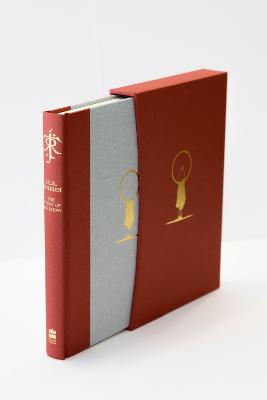
The world first publication of a previously unknown work of fantasy by J.R.R. Tolkien, which tells the powerful story of a doomed young man who is sold into slavery and who swears revenge on the magician who killed his father.
Kullervo son of Kalervo is perhaps the darkest and most tragic of all J.R.R. Tolkien’s characters. ‘Hapless Kullervo’, as Tolkien called him, is a luckless orphan boy with supernatural powers and a tragic destiny.
Brought up in the homestead of the dark magician Untamo, who killed his father, kidnapped his mother, and who tries three times to kill him...
Read more
The world first publication of a previously unknown work of fantasy by J.R.R. Tolkien, which tells the powerful story of a doomed young man who is sold into slavery and who swears revenge on the magician who killed his father.
Kullervo son of Kalervo is perhaps the darkest and most tragic of all J.R.R. Tolkien’s characters. ‘Hapless Kullervo’, as Tolkien called him, is a luckless orphan boy with supernatural powers and a tragic destiny.
Brought up in the homestead of the dark magician Untamo, who killed his father, kidnapped his mother, and who tries three times to kill him when still a boy, Kullervo is alone save for the love of his twin sister, Wanona, and guarded by the magical powers of the black dog, Musti. When Kullervo is sold into slavery he swears revenge on the magician, but he will learn that even at the point of vengeance there is no escape from the cruellest of fates.
Tolkien wrote that The Story of Kullervo was ‘the germ of my attempt to write legends of my own’, and was ‘a major matter in the legends of the First Age’; his Kullervo was the ancestor of Túrin Turambar, tragic incestuous hero of The Silmarillion. In addition to being a powerful story in its own right, The Story of Kullervo – published here for the first time with the author’s drafts, notes and lecture-essays on its source-work, The Kalevala, is a foundation stone in the structure of Tolkien’s invented world.
- ISBN13 9780008166724
- Publish Date 20 October 2016 (first published 27 August 2015)
- Publish Status Active
- Publish Country GB
- Publisher HarperCollins Publishers Inc
- Imprint HarperCollins
- Edition Deluxe Slipcased edition
- Format Hardcover
- Pages 192
- Language English
- URL http://harpercollins.co.uk
Reviews


Briana @ Pages Unbound
The editor unquestionably was struggling to find enough content to fill out a book. The story itself is short and unfinished, so Flieger compensates by adding images of manuscript pages in Tolkien's own hand, a few note son the text, and two drafts of the same essay at the end. Now, these things do have some merit for an academic audience. Manuscript studies (particularly for older texts) is certainly a thing, and dedicated Tolkien scholars will be interested in seeing two drafts of one essay and seeing how Tolkien's work evolved. A more general audience probably will not be. (I mean, as an English grad student and an avid Tolkien fan, I was barely interested in these things.)
The story itself also assumes knowledge of the Kalevala, which I shall go out on a limb and predict most general readers in the US do not. I know nothing of the Kalevala and was a bit confused by the story. And, unfortunately, Flieger has followed Christopher Tolkien's lead in not marking notes in the main body of the story. Readers have to read the story and hold a finger open in the notes section at the same time, then flip back and check if there's a helpful note for anything they find confusing. (Sometimes there is; sometimes there isn't.) As with reading Beowulf, I ended up just reading the story and then reading the notes in a block when I was one., which was only manageable in this case because the story itself was so short.
"The Story of Kullervo" is also disappointing, at least in a literary sense. I will completely advocate for its value in terms of understanding Tolkien's writing history and process. However, the story was written when Tolkien was fairly young, still in college, and it shows. The prose isn't as polished as that in his later works. In fact, it's full of exactly the pseudo-Old-English ("Ye Olde English," Thanks, Jubilaire!) that gets under my skin. So, while it's good to know Tolkien really did a lot of work on cultivating a more natural-sounding "older" English during his career, I am not a fan of his early experiments with the style.
I also found the tale confusing to follow and not fleshed-out in a way typical of myths. The general gist was: This happened, then this happened, then this happened. I actually would have liked to see Tolkien do more with his source material and expand on it, perhaps to make a novel. A lot of it is simply inexplicable and perhaps makes sense to those familiar with the source, but that isn’t clearly conveyed here, and I would have liked to see a retelling make more sense for the contemporary reader.
As for the final essay, I confess I didn't get around to reading it yet. I finished the rest of the book and was perplexed and uncertain whether I should read more on the Kalevala before proceeding...and my interest in getting to the essay simply never perked up. I hope to get to it in the future. I hope it adds depth to a story I otherwise didn't quite understand. But mostly this Tolkien edition has left me unsatisfied. I was planning on purchasing this upon release, but now I'm considering waiting for a paperback edition.
